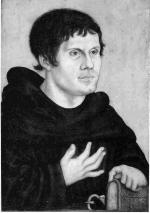|
This section contains 4,539 words (approx. 16 pages at 300 words per page) |

|
SOURCE: "The True Church and the Empirical Church," in The Theology of Martin Luther, translated by Robert C. Schultz, Fortress Press, 1966, pp. 333–44.
In the following excerpt, Althaus explains how Luther used scriptural authority to distinguish between the "true" Church and the exercise of ecclesiastical power.
the Authority of Tradition and Its Limitation
For Luther the Christian church is, without detriment to its spiritual nature, a historical reality, which constantly existed through all the centuries from the time of the apostles till his own time. The Evangelicals are not another and a new church but "the true old church, one body with the entire holy Christian church, and one community of saints."1 In spite of all his heartfelt criticism of the Roman Church, Luther remained certain that God had, in spite of everything, miraculously preserved the true church even in the midst of its Babylonian captivity.2 The Evangelicals received...
|
This section contains 4,539 words (approx. 16 pages at 300 words per page) |

|


